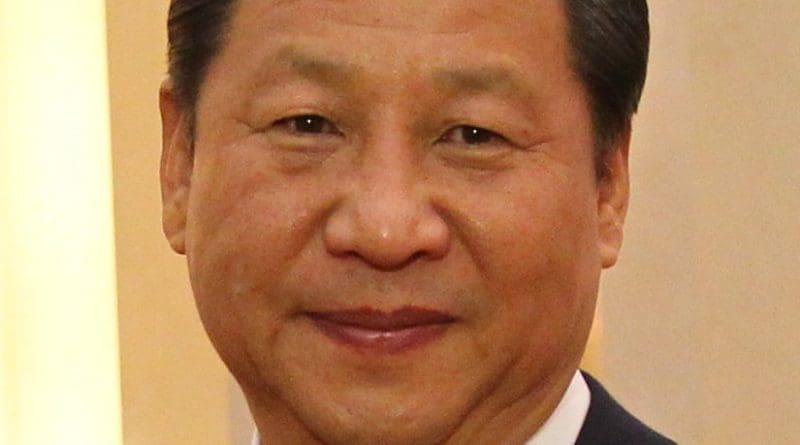China: What Xi Jinping May Tell UN General Assembly – Analysis
By SAAG
By Bhaskar Roy
One of China’s leading official newspapers, the Global Times (Sept 22), gave a hint on some important points that President Xi Jinping may expound on, in his speech to the UN General Assembly next week. The report gave brief glimpses of a Position Paper prepared by leading Chinese experts for Xi’s address.
Wu Xinbo, director of the Center for American Studies at Shanghai’s Fudan University told the Global Times, “President Xi’s speech to be delivered at the UN summit will be closely linked to the Position Paper, as the international community is keen to know China’s views on the present global order”.
Before departing for the US, Xi told the Wall Street Journal that global governance system is shared by the world and not by a single country, with the UN at its core. Xi also said that it was necessary to adjust and reform the global governance system (read UN) and mechanism. The reform (of the UN) is not about dismantling the existing system and creating a new one in its place.
The Chinese, along with Pakistan, with surprising support from Russia, tried to obstruct the adoption of a discussion paper on the reform of the UN including expansion of the permanent members of the Security Council with veto powers. The US stood on the side-lines. The China led move did not succeed and the paper is now a UN document for future discussions on the subject.
When the UN was founded it had only 55 members and five permanent members (P-5) with veto powers. Now the UN has 193 members but the P-5 remains. A huge imbalance has crept in over the decades, with disproportionate powers held in the hands of the five. Does Xi Jinping equate expansion of the permanent members with dismantling the UN system?
Obviously, the intention of China is to cling to inordinate power and suppress countries like India and Japan who have achieved the status to take up greater responsibilities like veto power in the UN. A greater role for India, as the Chinese say, means nothing. The aim is to scuttle reform of the UN and retain the status quo indefinitely.
The Chinese position paper says, “We must reject double standard and not link terrorism with any particular country, ethnicity and religion.” If Xi Jinping articulates this position then the international community will be within its rights to question China’s commitment to counter-terrorism and fighting terrorism. It has become clear that China has been using its veto power in the UN not only to protect Pakistan from charges of state sponsor of terrorism, but also protect Pakistan sponsored terrorists likes Hafeez Saeed and Zakiur Rehman Lakhvi.
Yet, in the run up to the 2008 Beijing Olympics Chinese leaders including the party chief of Xinjiang accused Pakistan of harbouring Uighur separatists who wanted to disrupt the games. Countries and ethnicity on terrorism matter when they hurt China, but they are looked at differently when they serve China’s foreign policy.
It is in China’s interest that Pakistan continues with terrorism against India and India wastes it resources and intellect in countering Pakistan sponsored terror. It is a strategy that is reflected in the book “Unrestricted Warfare”, written by two brilliant strategists of the Chinese army, the PLA, colonels Qiao Liang and Wang Xiangsui.
Having positioned itself somewhat of a centre stage in the Afghan issue with US military withdrawal from Afghanistan, China is apparently moving towards lifting the label of “terrorists” from the Afghan Taliban. It is well known that while the Chinese did not accord official recognition to the Taliban government in Kabul, it kept in quiet touch with the Taliban government and did business with them. Terrorism is being used as a strategic tool by China. This is a dangerous Chinese policy which, if allowed to proceed unchallenged, will be a threat not only for India but for the region and the global community.
The US waded into Afghanistan after the “9/11 terrorist attack” on its territory, and is in a hurry for a face saving exit. China, along with Pakistan, is their best bet. As for Russia, the west has driven President Vladimir Putin into China’s embrace. It will take some time for Putin to realise that China is cutting the ground under Russia’s feet.
According to the Chinese position paper, Xi is expected to address the Cyber Security issue. “China is in favour of stronger international cooperation on the basis of mutual respect, equality and mutual benefit and the establishment of a peaceful, secure, open and cooperative cyberspace”, the paper said. These are standard Chinese words and phrases when they find themselves under pressure. The only meaning that can be interpreted by those words and phrases is what serves China the best. This can be seen from the South China Sea dispute and other agreements.
China’s cyber espionage has recently been under severe pressure from the US. The US claim they have suffered losses to the tune of hundreds of billions of dollars in intellectual property loss by American companies. China is also alleged to have stolen personal data of millions of Americans leading to fear of security threats.
China will get around President Barack Obama on the Cyber espionage issue, and grounds have been made for a major cyber agreement with the US which is ready to be signed during Xi’s visit.
But the impact and challenge should not be lost on countries like India which have opened their floodgates to Chinese entities with dubious reputation.
The UN is an excellent forum for China to safeguard itself and promote questionable policies, Beijing is unlikely to allow a real reform of the UN.

